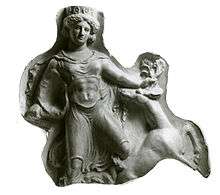Hemithorakion
Hemithorakion (hemi- thorax) was an ancient Greek half-armour that covered the midriff or abdomen area. The inventor is believed to be the Thessalian king Jason of Pherae.[1] It was an equipment of the officers, not of common soldiers.[2] Plutarch records that hemithorakia were worn by Pelopidas and his soldiers during the battle to expel the Spartans from Thebes in 379, a battle in which Pelopidas and his men disguised themselves as women. In art, it is generally seen on female warriors, which corroborates Plutarch's account. Instances in art include several vase depicitions on Amazons. An unusual intact terra cotta mold from Morgantina, dating from the first half of the fourth century, shows Artemis wearing the hemithorakia while sacrificing a hind. [3]
See also
References
- ↑ The Cambridge Ancient History, John Boardman, 183 ISBN 0-521-85073-8
- ↑ Amphipolis (ca. 200 BC) SEG 40.524
- ↑ Bell, Malcolm. Morgantina Studies vol. 1 (Princeton: Princeton University Press 1981), 35.
